Brassens the poet, the singer, the guitarist ... the word legend should suit, even if he wouldn't have appreciated it ... When, it his time, the yeye, coming from USA, overran the France, Brassens not only managed to resist to him, but also enchanted a whole generation of young with his lyrics and his voice.
A sultry voice, a omnipresent gaiety, and of course some very strong criticisms, Brassens' works seem to be eternal. The purpose of this page is to allow to English-speaking people to discover one of the most famous French singer ...
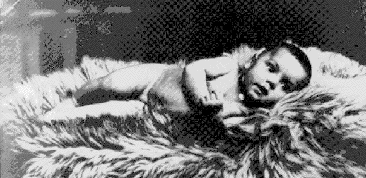
Brassens was born in 1921, October 21st in Cette ( which will name later on "Sète" ), at the Rue de l'Hospice 54 ( which will name later on "Henri Barbusse ). This changes of name will be later the topic of one of his songs.
It's like a predestination to be born in the city of Paul Valéry, this famous poet who pried himself on making alexandrines as one makes clocks ...
Brassens was surrounded by songs since his birth, with his mother and sister who sang from the morning to the evening in the kitchen ( Ray Ventura and other jazz classics ), his grandfather who hummed while he cultivated laboriously roses in the bad soil of the garden ... owing to the phonograph, the radio and the speaking cinema, Brassens profited very early by a real " sonorous encyclopaedia ".
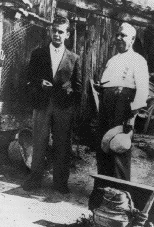 Elvira, George's mother, who was of Neapolitan origin, had already a daughter, Simone, from a first marriage .She was very devout, opposing to her husband, Jean-Louis, a mason, very liberal and anticlerical. He accept his son to be christened, but he didn't go to his sacrament .
Elvira, George's mother, who was of Neapolitan origin, had already a daughter, Simone, from a first marriage .She was very devout, opposing to her husband, Jean-Louis, a mason, very liberal and anticlerical. He accept his son to be christened, but he didn't go to his sacrament .
From him Brassens will learn goodness, fidelity and hatred of hypocrisy, besides it's to him that the poet had bequeathed one of his most beautiful song : Les Quatre Bacheliers.
His mother is a passionate and demonstrative faithful and it's under her influence that Georges meddled with Catholicism : religious archetypal are present in his work, like in La marguerite or La religieuse.
Therefor he get a solid religious education, whose he kept an very bad remembrance, even if he was grateful to her for her exacting laic moral.
Georges hasn't taste for study ( maybe the setting of the college of Sète, whose the director did door-to-door transport to find students, and where the chemistry teacher come and teach on donkeyback ...). But Alphonse Bonnafe, French teacher initiates Georges to the poetry of Verlaine, Baudelaire, Valery and Mallarmé...
Georges spend yet his time in the street where he discover the friendship ( Les copains d'abord ) and its disillusions ... As a matter of fact, was formed a friendship with a band of young malefactors, without taking part to their activities
But after they had perpetrate a theft in a jewellery, policemen took Georges with them : he found himself in the central police station, and whereas the parents of his friends deny their child, Georges' father rush towards him and shows him his tenderness .
In spite of all, we can fancy the slanders which spread abroad at the Rue de l'Hospice ... ( cf. La Mauvaise Réputation ).
It's probably this "scandal" which egged him on leaving the college ( he's now 18 years old ) : he go to Paris, where shines Valéry or Jean Villar ( another famous Sètois ). His arrival in the capital is related in Les ricochets.
The first year, he lives in the XIVth district, which will become his second fatherland ( cf.Le bistrot ). He works during some months at Renault, but carry on his poet job .
He spend much time in public libraries, read and read again Lamartine, Paul Fort, Francis Jammes, Rimbaud, Villon or Mathurin Regnier, study the metric, the concatenation of the themes ... He write about a hundred songs and poems : some of them will be published in 1942, under the title of "A la venvole".
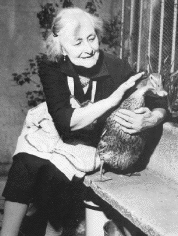 In 1943 ( he's 22 ), he's impressed by the S.T.O ( compulsory working ), and he's sent in Germany. On his return, he lodge in a boarding house, at the Impasse Florimont ( in the XIVth also ), at the famous Jeanne, whose several songs celebrate the generosity and tenderness for all the creatures ( cf.Jeanne ).
In 1943 ( he's 22 ), he's impressed by the S.T.O ( compulsory working ), and he's sent in Germany. On his return, he lodge in a boarding house, at the Impasse Florimont ( in the XIVth also ), at the famous Jeanne, whose several songs celebrate the generosity and tenderness for all the creatures ( cf.Jeanne ).
This warm presence bring some consolation to the poet who lives a dark period of poverty and discouragement ( P... de toi ).
Brassens contributes to the newspaper Le Libertaire, he reads the masters of Anarchism ( Proudhon ). He's got a visceral fondness for liberty, and hatred of all kinds of domination.
Then a true conversion occurs in his conception of poetry. Indeed, up to now he wanted separate the songs he wrote to earn his living ( " un texte sans prétention et une musique la meilleure possible " : unassuming lyrics and music the best is possible ) and reservate the best of his inspiration to his poems.
An ambitious program, its check will make bitter his 30 years ... That's why he try an other approach, as he explain it in his interview by André Sève :
Je me suis dit : "Pas la peine d'insister,
tu ne seras jamais un grand poète,
tu ne seras pas un Rimbaud, un Mallarmé, un Villon (...)
Pourquoi, sur tes musiques, tu n'essayerais
pas tes poèmes? Des poèmes qui n'atteindraient
pas le génie mais qui feraient des chansons
potables, pas trop mal écrites..."
( I said to myself : why do you insist, you will never be a great poet, you will never be like Rimbaud, Mallarmé or Villon (...) Why not try your poems on your songs ? Some poems which wouldn't be full genius, but they would done tolerably good songs, quiet well-written ... )
We can say that Brassens - the world-wide renowned Brassens - was born of this decision.
It's probably at the same time that he wrote his only novel, La Tour des Miracles :
In 1952, when he's just 31 years old, he meet the song-writer Jacques Grello. He gives him a guitar - later on he will explain that he had bought this guitar owing to a overpayment a tax-collector came to refund him : Brassens will owe his career to this zealous civil servant ! - so he gives him the guitar and won't never take it again : Brassens' chords are on the first two discs.
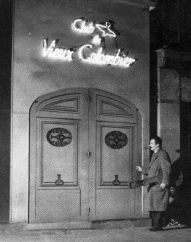 Grello likes a lot Brassens' songs, and it's a precious encouragement for the poet, who began to be seriously in the doubt ... A true friendship forms between the two men. Grello introduce Brassens in some Parisian clubs, and encourage him to persevere. Finally, he present him to Patachou, and Brassens plays in his famous Cabaret-Restaurant in Montmartre ... But she's Brassens interpret, and Brave Margot or Les amoureux des bancs publics will be firstly song by this woman's voice, by turns touching and bantering .
Grello likes a lot Brassens' songs, and it's a precious encouragement for the poet, who began to be seriously in the doubt ... A true friendship forms between the two men. Grello introduce Brassens in some Parisian clubs, and encourage him to persevere. Finally, he present him to Patachou, and Brassens plays in his famous Cabaret-Restaurant in Montmartre ... But she's Brassens interpret, and Brave Margot or Les amoureux des bancs publics will be firstly song by this woman's voice, by turns touching and bantering .
Then she invites him to song himself his poems, in spite of his reserve, due to his natural timidity and the startle of his first audiences. But now Brassens is set on his feet : he sings at "Aux Trois Baudet", "Concert Pacra" or at "l'Alhambra". He records his first discs, gives his first interviews ...
The author of Le Tripoteur, who will become a great friend of Brassens, celebrate the intrusion of an authentic voice among all the affected silliness the radio imposes :

Une voix en forme de drapeau noir,
de robe qui sèche au soleil, de coup de poing sur le képi,
une voix qui va aux fraises , à la bagarre et ... à la chasse aux papillons
( A black flag-shaped voice, a sun-dried dress, a punch on the képi, a voice who go and pluck strawberries, who go and fight, who go and catch ... butterflies )
The manuscript of La Non Demande en Mariage
Henceforth, Brassens' life will be shared between the compositions and the recitals. But more than public appearances, that's the discs which stand out as landmarks in his career. The 12 "trente centimètres" ( Philips ) allow us to situate each poems in his time, and so to discern the different steps of his inspiration and style.
In 1954, Brassens get the "Grand Prix du Disque", discerned by the Charles Cros Academy, for the disc Philips 432065 : Le parapluie, Il n'y a pas d'amour heureux, J'ai rendez-vous avec vous, La chasse aux papillons ...
In 1966, Brassens is on tour with Juliette Greco.
The following year, l'Académie Française gives him the Poetry price.
But in the same time, the hefty singer knows the disease : he has violent nephritic colic, which will always torture him, despite of a medical intervention. During the summer of the year 1981, he goes to Sète, and on October 29th 1981, Brassens die in Saint Gély, at his friend's home, the doctor Maurice Bousquet.
Thus the poet's face has been gradually carved . But this face hasn't been corrupted - as many other faces - by the time, but on the contrary it becomes pur, little by little transparent to his own truth ... Because this face, this frank face, where the look rules, sovereign, stamped with amused tenderness, indulgent, upright, with a passing melancholy, is the face of a man who has managed to reach his truth, maybe that poetry, his poetry, isn't over of his songs, but inside .
DISCOGRAPHY
CD 1/La mauvaise réputation
01-La mauvaise réputation
02-Le fossoyeur
03-Le gorille
04-Le petit cheval
05-Le parapluie
06-Ballade des dames du temps jadis
07-La marine
08-Il suffit de passer le pont
09-Comme hier
10-Les amoureux des bancs publics
11-Brave Margot
12-La cane de Jeanne
13-J'ai rendez-vous avec vous
14-Le vent
15-Il n'y a pas d'amour heureux
16-Le nombril des femmes d'agent
17-Pauvre Martin
18-La première fille
19-Je suis un voyou
20-La mauvaise herbe
21-Le mauvais sujet repenti
22-Putain de toi
23-Chanson de l'Auvergnat
24-Les sabots d'Hélène
CD 2 / Auprès de mon arbre UP
01-Une jolie fleur
02-Gastibelza
03-La prière
04-Hécatombe
05-La chasse aux papillons
06-Corne d'aurochs
07-Marinette
08-La légende de la nonne
09-Colombine
10-Auprès de mon arbre
11-Le testament
12-Je me suis fait tout petit
13-Les croquants
14-L'amandier
15-Oncle Archibald
16-La marche nuptiale
17-Les Lilas
18-Au bois de mon coeur
19-Grand Père
20-Celui qui a mal tourné
CD 3 / Le pornographe UP
01-Maman Papa
02-Le vin
03-Philistins
04-Le vieux Léon
05-La ronde des jurons
06-A l'ombre du coeur de ma mie
07-Le pornographe
08-La femme d'Hector
09-Bonhomme
10-Le cocu
11-Comme une soeur
12-Le père Noël et la petite fille
13-Les funérailles d'antan
14-Le bistrot
15-Embrasse les tous
16-Pénélope
17-L'orage
18-Le mécréant
19-Le verger du roi Louis
20-La traîtresse
CD 4 / Les copains d'abord UP
01-Tonton Nestor
02-La ballade des cimetières
03-L'enterrement de Verlaine
04-Germaine Tourangelle
05-A Mireille dit 'petit verglas'
06-Le temps passé
07-La fille à cent sous
08-Dans l'eau de la claire fontaine
09-Je rejoindrai ma belle
10-Si le bon dieu l'avait voulu
11-Le temps ne fait rien à l'affaire
12-La complainte des filles de joie
13-Les trompettes de la renommée
14-La guerre de 14-18
15-La marguerite
16-La Jeanne
17-Les amours d'antan
18-Marquise
19-L'assassinat
20-Les copains d'abord
21-Les quat'zarts
22-Le petit joueur de fluteau
CD 5 / Supplique pour être enterré ... UP
01-Les deux oncles
02-Le 22 septembre
03-La tondue
04-Venus Callipyge
05-Le mouton de Panurge
06-La route aux 4 chansons
07-Saturne
08-Le grand Pan
09-Supplique pour être enterré ...
10-Le fantôme
11-La fessée
12-Le pluriel
13-Les 4 bacheliers
14-Le bulletin de santé
CD 6 / La non demande en mariage UP
01-La non demande en mariage
02-Le grand chêne
03-Concurrence déloyale
04-L'épave
05-Le moyenageux
06-Misogynie mise à part
07-Bécassine
08-L'ancêtre
09-Rien à jeter
10-Les oiseaux de passage
11-La religieuse
12-Pensée des morts
13-La rose, la bouteille et la poignée de main
14-Sale petit bonhomme
CD 7 / Mourir pour des idées UP
01-Heureux qui comme Ulysse
02-Fernande
03-Stances à un cambrioleur
04-La ballade des gens qui sont nés quelque part
05-La princesse et le croque notes
06-Sauf le respect que je vous dois
07-Le blason
08-Quatre-vingt-quinze pour cent
09-Mourir pour des idées
10-Les passantes
11-Le roi
12-A l'ombre des maris
13-Carcassonne
14-Ballade à la lune
15-Jehan l'advenu
16-A mon frère revenant d'Italie
17-Le roi boiteux
CD 8 / Tempête dans un bénitier UP
01-Trompe la mort
02-Les ricochets
03-Tempête dans un bénitier
04-Le boulevard du temps qui passe
05-Le modeste
06-Mélanie
07-Les casseuses
09-Cupidon s'en fout
10-Montélimar
11-Histoire de faussaires
12-La messe au pendu
13-Lèche cocu
14-Les patriotes
15-La visite
16-Elégie à un rat de cave
CD 9 / Last ones (Jean Bertolat) UP
01-Quand les cons sont braves
02-Méchante avec de jolis seins
03-Dieu s'il existe
04-Le vieux normand
05-Le passeistes
06-Ceux qui ne pensent pas come nous
07-La visite
08-La nymphomane
09-Clairette et la fourmi
10-Entre la rue Didot et la rue de Vanves
11-L'andropause
12-Entre l'Espagne et l'Italie
13-La maitresse d'école
14-Ce n'est pas tout d'être mon Père
15-Le sceptique
16-Retouches à un roman d'amour de 4 sous
17-Le pêcheur
LINKS TO OTHER PAGES
Click here to go The Georges Brassens American Fan club, where you can find translations of his most famous songs.
The other sites are in French :
Brassens for ever : About Brassens, his work, his life
Brassens midi : Brassens songs in midi format
G.Bloncourt's Site : all about Brassens !
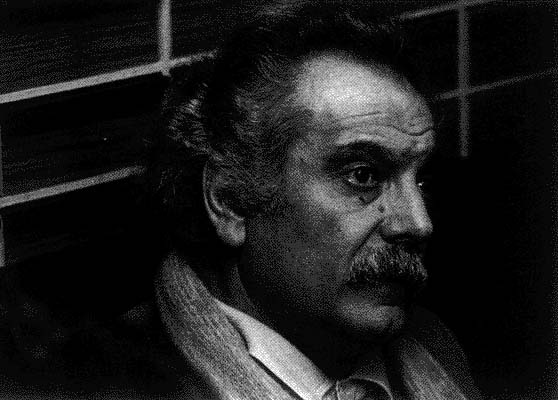


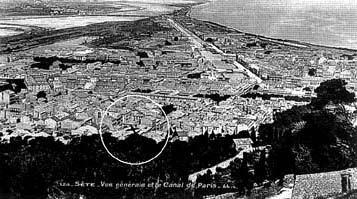
 Elvira, George's mother, who was of Neapolitan origin, had already a daughter, Simone, from a first marriage .She was very devout, opposing to her husband, Jean-Louis, a mason, very liberal and anticlerical. He accept his son to be christened, but he didn't go to his sacrament .
Elvira, George's mother, who was of Neapolitan origin, had already a daughter, Simone, from a first marriage .She was very devout, opposing to her husband, Jean-Louis, a mason, very liberal and anticlerical. He accept his son to be christened, but he didn't go to his sacrament .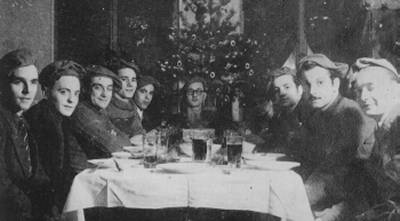
 In 1943 ( he's 22 ), he's impressed by the S.T.O ( compulsory working ), and he's sent in Germany. On his return, he lodge in a boarding house, at the Impasse Florimont ( in the XIVth also ), at the famous Jeanne, whose several songs celebrate the generosity and tenderness for all the creatures ( cf.Jeanne ).
In 1943 ( he's 22 ), he's impressed by the S.T.O ( compulsory working ), and he's sent in Germany. On his return, he lodge in a boarding house, at the Impasse Florimont ( in the XIVth also ), at the famous Jeanne, whose several songs celebrate the generosity and tenderness for all the creatures ( cf.Jeanne ).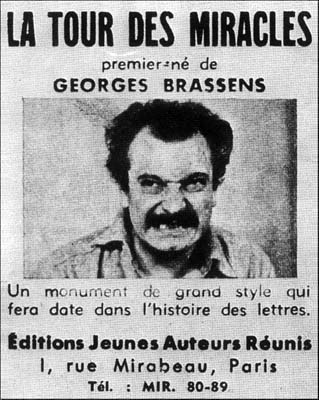
 Grello likes a lot Brassens' songs, and it's a precious encouragement for the poet, who began to be seriously in the doubt ... A true friendship forms between the two men. Grello introduce Brassens in some Parisian clubs, and encourage him to persevere. Finally, he present him to Patachou, and Brassens plays in his famous Cabaret-Restaurant in Montmartre ... But she's Brassens interpret, and Brave Margot or Les amoureux des bancs publics will be firstly song by this woman's voice, by turns touching and bantering .
Grello likes a lot Brassens' songs, and it's a precious encouragement for the poet, who began to be seriously in the doubt ... A true friendship forms between the two men. Grello introduce Brassens in some Parisian clubs, and encourage him to persevere. Finally, he present him to Patachou, and Brassens plays in his famous Cabaret-Restaurant in Montmartre ... But she's Brassens interpret, and Brave Margot or Les amoureux des bancs publics will be firstly song by this woman's voice, by turns touching and bantering .